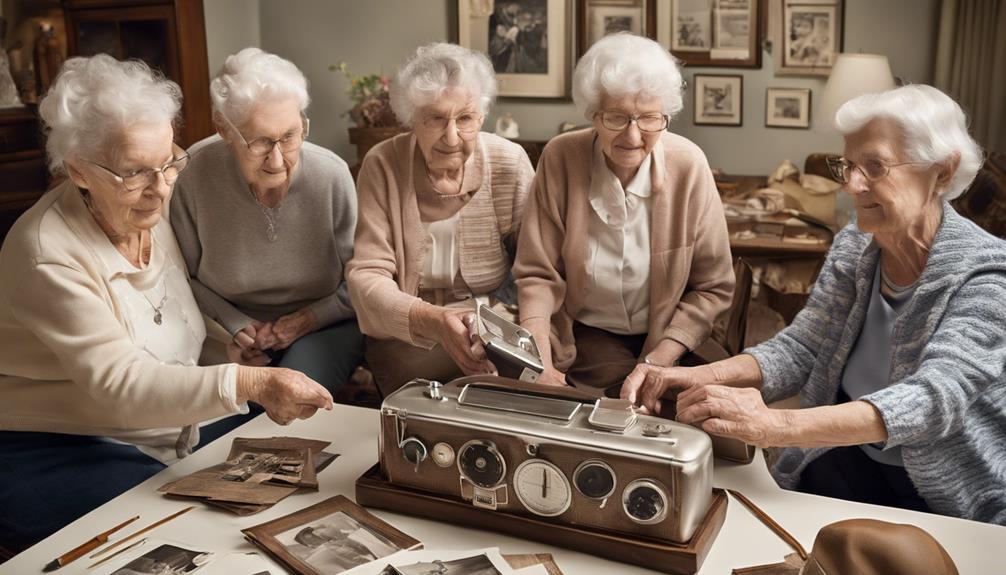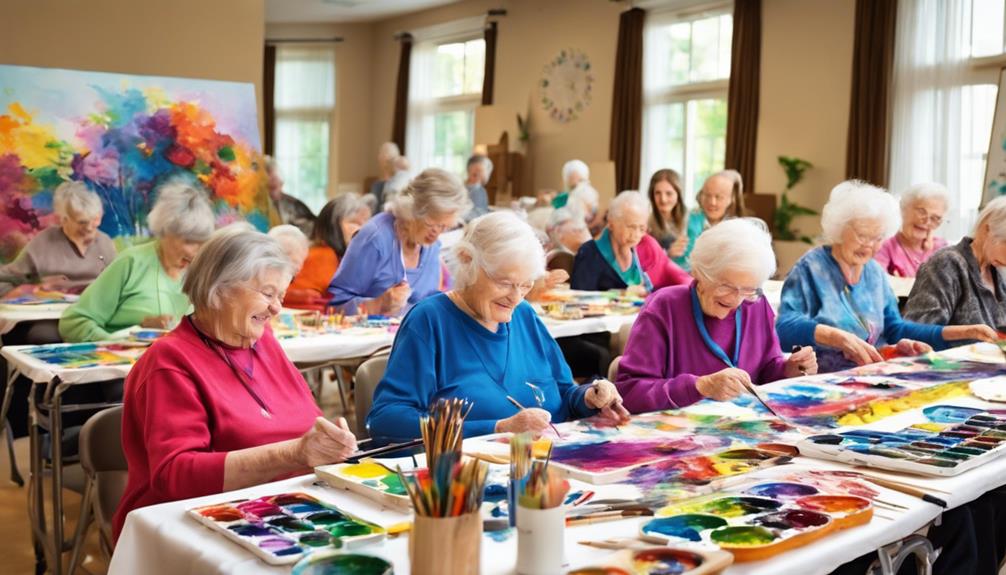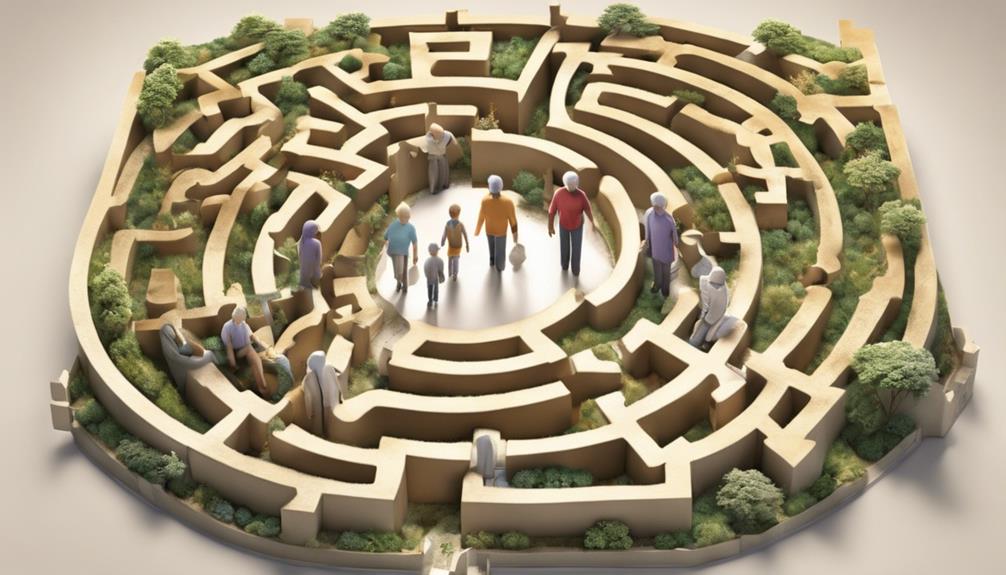Engage individuals with dementia through sensory activities such as sensory boxes and storytelling. Utilize music therapy to improve mood and memory, tailored to individual preferences. Creative arts can provide an outlet for self-expression and mood enhancement. Implement physical exercises like scarf dancing and chair exercises to enhance balance and cognition. Encourage social interactions and memory through initiatives like tea parties. Cooking projects can help build social bonds and cognitive skills. Outdoor experiences such as nature walks can have a calming effect and aid cognition. Pet therapy can reduce stress and loneliness, benefiting emotional health. Utilize technology for virtual tours and brain apps. Reminisce through movies and music to foster emotional connections. Explore additional ways to engage for improved well-being and quality of life.
Key Takeaways
- Sensory stimulation activities trigger memories and enhance well-being in dementia patients.
- Music therapy sessions improve mood, cognitive function, and memory recall.
- Creative arts and crafts provide sensory engagement and self-expression opportunities.
- Physical movement exercises enhance balance, coordination, and cognitive function.
- Social connection initiatives promote engagement, communication, and memory recall.
Sensory Stimulation Activities
Engage dementia patients in sensory stimulation activities to trigger memories and enhance their well-being. Sensory stimulation involves stimulating the senses through touch, smell, sight, and sound. For dementia patients, these activities can improve cognitive function, reduce agitation, and promote relaxation. Incorporating sensory stimulation into daily care routines can create a calming and engaging environment.
Sensory boxes filled with various objects, sensory gardens with different plants, and sensory storytelling sessions can provide meaningful experiences for dementia patients. Tactile experiences, such as feeling different textures, and aromatherapy using scents like lavender or citrus, are beneficial. Research has shown that sensory stimulation can have a positive impact on individuals with dementia, improving their overall quality of life. By integrating sensory activities into daily care, caregivers can help dementia patients connect with their surroundings, evoke memories, and enjoy moments of relaxation and joy.
Music Therapy Sessions

Music therapy sessions have demonstrated significant benefits for dementia patients, including improving mood, reducing agitation, and enhancing cognitive function. Engaging in these sessions can stimulate memory recall, evoke positive emotions, and lead to increased social interaction. By tailoring the music therapy to individual preferences, such as incorporating familiar songs or personalized playlists, specific memories can be evoked, enhancing the overall experience.
To illustrate the impact of music therapy on dementia patients, let's consider the following table:
| Benefits of Music Therapy Sessions |
|---|
| Mood Improvement |
| Memory Recall |
| Social Interaction |
| Quality of Life |
Through music therapy, individuals with dementia can experience reduced stress levels, improved communication, and a higher quality of life. These sessions not only provide a sensory experience but also create a supportive environment that fosters emotional well-being and connection.
Creative Arts and Crafts Ideas
Exploring various creative arts and crafts activities can provide meaningful sensory engagement and foster self-expression for individuals living with dementia. Engaging in activities like painting, drawing, and creating collages can't only be enjoyable but also improve mood and cognitive function in dementia patients. These creative outlets stimulate the senses and offer a platform for self-expression, allowing individuals to communicate and connect with their surroundings.
Additionally, participating in sensory craft experiences with different textures can provide tactile stimulation and enhance sensory awareness, creating a multi-dimensional experience. Crafting with familiar objects and materials can trigger memories, offering comfort and a sense of familiarity. Studies have shown that engaging in art activities can reduce agitation, anxiety, and depression in individuals with dementia, making creative arts and crafts a valuable tool in enhancing the overall well-being of those living with this condition.
Physical Movement Exercises

When considering activities for dementia patients, incorporating physical movement exercises such as scarf dancing and Tai Chi can noticeably enhance balance and cognitive function. Dress-up activities and step dancing also provide enjoyable ways for individuals with dementia to stay active.
Balloon batting is another engaging exercise that promotes movement and coordination in seniors with dementia. Additionally, chair exercises offer a convenient option for those with mobility impairments to maintain physical health. These activities not only help improve balance but also support cognitive function in dementia patients.
Gentle exercises and outdoor walks can further contribute to the overall well-being of individuals living with dementia by promoting physical activity. By incorporating these physical movement exercises into their routine, caregivers can provide meaningful and beneficial experiences for dementia patients, enhancing both their physical and cognitive health.
Social Connection Initiatives
To enhance the well-being of dementia patients, implementing social connection initiatives is essential for fostering engagement and communication. Group storytelling sessions offer a fantastic way for individuals with dementia to connect with others, share experiences, and exercise their communication skills. Tea parties create a warm and inviting atmosphere, encouraging social interaction and building a sense of community among participants. Memory games not only stimulate cognitive function and memory recall but also promote social engagement and friendly competition. Group outings provide opportunities for dementia patients to explore new environments, engage with their surroundings, and enjoy novel experiences with peers. Volunteer opportunities allow individuals with dementia to give back to their community, fostering a sense of purpose and fulfillment while encouraging social interaction and a feeling of belonging. These initiatives play an important role in enhancing the overall well-being and quality of life for dementia patients.
| Social Connection Initiatives | Benefits |
|---|---|
| Group Storytelling Sessions | Promote engagement and communication |
| Tea Parties | Encourage social interaction and community building |
| Memory Games | Stimulate cognitive function and memory recall |
| Group Outings | Provide opportunities for new experiences |
| Volunteer Opportunities | Foster a sense of purpose and fulfillment |
Cooking and Baking Projects

Engaging in cooking and baking projects with dementia patients can provide a meaningful and stimulating activity that appeals to their senses and fosters social interaction. Simple recipes like baking cookies or preparing meals together can create a sense of accomplishment and purpose. These activities not only stimulate the senses of taste and smell but also promote social bonding among participants.
For dementia patients, engaging in cooking can help maintain cognitive function and fine motor skills. Following step-by-step instructions in simple recipes can bring joy and fulfillment to individuals with dementia. It's crucial to choose recipes that are easy to follow and involve minimal hazards. Encouraging patients to participate in measuring ingredients, mixing, or decorating can enhance their sensory stimulation and cognitive abilities.
Outdoor Nature Experiences

How can outdoor nature experiences benefit dementia patients?
Engaging in activities like nature walks, birdwatching, picnics, and gardening can have a positive impact on their well-being. Here are some ways outdoor nature experiences can be beneficial:
- Sensory Stimulation: Being outdoors exposes dementia patients to different sights, sounds, and smells, stimulating their senses and helping them feel more connected to the world around them.
- Relaxation: Nature has a calming effect on individuals. Enjoying the fresh air and serene environment during outdoor activities can help reduce agitation and improve mood in dementia patients.
- Cognitive Function: Exposure to natural settings and sunlight can enhance cognitive function, memory, and overall mental well-being in individuals with dementia.
- Meaningful Experiences: Engaging in activities like nature photography and caring for plants can provide meaningful and enjoyable experiences, fostering a sense of purpose and accomplishment.
Pet Therapy Interactions

Pet therapy interactions can have positive effects on dementia patients, including reducing feelings of agitation and enhancing their mood. These interactions with therapy animals can also help combat loneliness and increase social engagement.
To make the most of pet therapy sessions, it's important to follow some tips for successful interactions that can benefit both the patients and the animals involved.
Benefits of Pet Therapy
Numerous studies have demonstrated the positive impact of pet therapy interactions on reducing symptoms of agitation and improving mood in dementia patients. Pet therapy not only helps in enhancing socialization but also plays an essential role in lowering blood pressure and boosting overall well-being. Here are some of the benefits of pet therapy for dementia patients:
- Reducing symptoms of agitation
- Improving mood and lowering stress levels
- Enhancing socialization and communication skills
- Promoting relaxation and calmness
Engaging with therapy animals in pet therapy sessions can also lead to improved cognitive function in seniors with dementia. The presence of animals in these activities has been linked to increased levels of relaxation and a sense of calmness in individuals with dementia.
Tips for Successful Interactions
Engaging with therapy animals during pet therapy sessions can greatly enhance the emotional well-being of dementia patients. Pet therapy interactions have been proven to reduce symptoms of agitation and improve social interactions in individuals with dementia.
Structured activities during pet therapy, such as grooming, petting, and playing with the animals, help promote emotional well-being. Studies have shown that pet therapy can decrease stress and anxiety levels in dementia patients, leading to an overall improvement in their quality of life.
Interacting with animals in pet therapy creates a sense of connection, reduces feelings of loneliness, and enhances mood, ultimately providing comfort to those with dementia. These interactions play a vital role in improving the well-being and happiness of individuals facing cognitive challenges.
Technology-Based Engagements

Utilizing technology-based engagements can greatly enhance the quality of life for dementia patients by fostering connectivity, cognitive function improvement, and interactive experiences. Here are some ways technology can benefit individuals with dementia:
- Virtual Museum Tours: Take a trip through history and art without leaving home. Virtual museum tours provide educational and enriching experiences, stimulating the mind and sparking curiosity.
- Online Games: Engage in fun and interactive games that challenge the brain and improve cognitive function. These games can help with memory retention and problem-solving skills.
- Video Calls: Stay connected with loved ones through video calls. These calls promote social interaction, emotional connection, and reduce feelings of isolation, providing comfort and support.
- Brain Training Apps: Enhance memory and cognitive skills with brain training apps designed to keep the mind sharp. These apps offer exercises and activities tailored to stimulate cognitive function and mental agility.
Reminiscence Activities

Incorporating reminiscence activities into daily routines can greatly enhance the emotional well-being and cognitive function of dementia patients. Engaging in activities that trigger memories, such as watching classic movies, looking at photo albums, or listening to familiar music, can help individuals with dementia recall cherished moments from their past. These activities not only stimulate memory but also provide emotional connection and comfort.
Many memory care communities offer reminiscence programs, highlighting their positive impact on residents. For dementia patients, looking through photo albums is a common and effective way to trigger treasured memories. Additionally, listening to music and singing along to familiar songs can further stimulate memory recall. By incorporating these reminiscence activities into the daily care routine, caregivers can create meaningful and engaging experiences that promote cognitive function and emotional well-being in individuals with dementia.
Frequently Asked Questions
How Do You Engage Dementia Patients in Activities?
We engage dementia patients in activities by tailoring tasks to abilities and interests. Sensory experiences like music, painting, and crafts stimulate memories. Reminiscence activities trigger positive memories. Social interactions through group activities, outings, and family visits promote emotional well-being.
How Do You Engage Someone With Dementia?
We engage someone with dementia by focusing on familiar activities they enjoy, encouraging simple tasks for accomplishment, providing sensory stimulation like music and aromatherapy, incorporating reminiscence activities, and offering social interaction opportunities to combat isolation. Additionally, offering structured routines can help reduce confusion and anxiety for individuals with dementia. Tailoring dementia activity ideas to match their current abilities ensures that the experiences are positive and fulfilling. By fostering a supportive and patient environment, caregivers can enhance the well-being of those living with dementia.
How Do You Keep Someone With Dementia Busy?
We make sure someone with dementia busy by providing a variety of activities that cater to their interests and capabilities. From reminiscing with photo albums to engaging in music and crafts, we guarantee they have meaningful and enjoyable experiences.
What Are the Engagement Activities for Dementia Patients?
Engagement activities for dementia patients can include painting, music, crafts, sensory experiences, and reminiscence activities. Tailoring these activities to their interests and abilities can reduce frustration and enhance their quality of life.
Conclusion
To sum up, engaging activities for dementia patients can provide valuable stimulation and enjoyment. Remember, variety is the spice of life, so mix and match these activities to keep things interesting for your loved one.
By incorporating sensory stimulation, music therapy, arts and crafts, physical movement, social connections, outdoor experiences, pet therapy, technology-based engagements, and reminiscence activities, you can create a well-rounded and enriching experience for those living with dementia.









